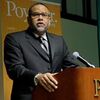We have a number of national emergencies on the books. Today's protest in Washington, DC, which began at noon in front of the AFL-CIO building on 16th Street NW, down the street from the White House, was meant to highlight the struggles of furloughed federal employees and out-of-work contractors. The partial shutdown that has left nine federal departments and several agencies closed since December 22 remains at a standstill today after a meeting between President Donald Trump and Democratic leaders in Congress unraveled yesterday. Trump delivered the first Oval Office address of his presidency Tuesday night — and it came in the midst of a protracted partial government shutdown. The president made no mention of the national emergency during his Oval Office speech. Why not?
The United States today refused to recognize Venezuelan President Nicolas Maduro's legitimacy as he starts a new term and urged rank-and-file government employees to empower the opposition. For a country which is complaining about outside interference, this sure sounds hypocritical and dangerous to me. "The US will not recognize the Maduro dictatorship's illegitimate inauguration," National Security Advisor John Bolton tweeted. "We will continue to increase pressure on the corrupt regime, support the democratic National Assembly and call for democracy and freedom in Venezuela," he wrote. Secretary of State Mike Pompeo called on Venezuelans to work not with Maduro but with the National Assembly, which is controlled by the opposition but has been sidelined by a new Constituent Assembly created by Maduro's government.
If you listen to Secretary of State Mike Pompeo, the Middle East has been plunged into chaos and violence because of two entities: Iran and former President Barack Obama. Now, under President Donald Trump, that's changing. In spite of the fact that Iran, by every measurable and verifiable agency available was adhering to the Iran Nuclear deal, Trump withdrew the US from the pact in May 2018. Pompeo delivered a scathing rebuke of Obama's Middle East policy in Cairo on Thursday in an address that centered on exerting maximum pressure on Iran and doubling down on the United States' alliances with Sunni autocrats and Israel. In establishing his own vision for the Middle East, Pompeo set up the Obama administration as a foil showing what not to do, whether it was striking the landmark nuclear deal with Iran in 2015 or leaving Egypt's autocratic president, Hosni Mubarak, in a lurch during that country's protests in 2011.
GUESTS:
Colin Campbell — PhD student in the Department of Communication, Culture and Media Studies at Howard University's School of Communication. He has been a TV news reporter for more than 20 years. As a senior Washington, DC, correspondent since 2008, he has been a reporter-at-large, covering two presidencies, Congress and the State Department.
Caleb Maupin — Journalist and political analyst who focuses his coverage on US foreign policy and the global system of monopoly capitalism and imperialism.
Dr. Ajamu Baraka — American political activist and former Green Party nominee for vice president of the United States in the 2016 election.
We'd love to get your feedback at radio@sputniknews.com



